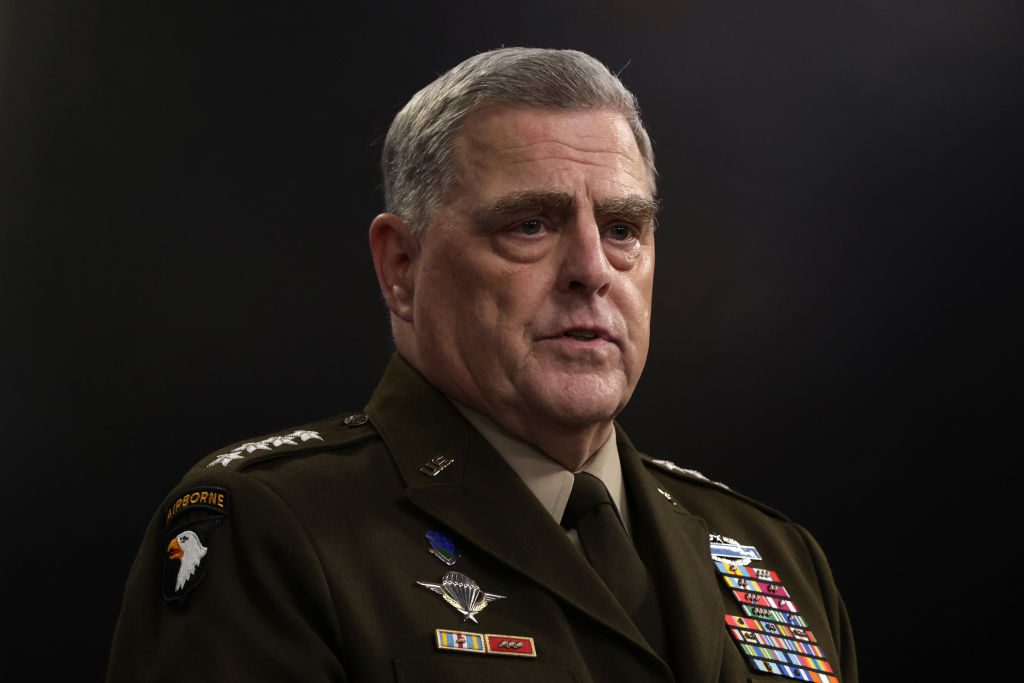The Crisis Of Confidence In America’s Military
Conservatives have turned on the generals while public trust in the armed forces plummets. Blame the stupid wars.

Mark Perry died last weekend. The longtime reporter and TAC contributor was, as Curt Mills put it in his obituary, an American original, though perhaps that’s only because his breed of journalist has all but gone extinct. Perry cut the figure long after it went out of style: leather jacket, sharp-witted sardonicism, smokes, whiskey. Unlike so many journos who view themselves as charter members of an elite club, he never seemed to give a shit what anyone thought of him. He was reflexively suspicious of all power rather than determined to curry favor with the right power.
That indiscriminate skepticism shone through in his writing for TAC, the best of which invariably focused on the Pentagon brass and the military-industrial complex. Perry understood well—perhaps better than anyone else—how to cover the armed forces. He exposed their abuses and screw-ups yet never lacked for sources in the upper echelons of the defense establishment. And while his passing is a serious loss, I can’t help but think there might be a silver lining here.
Perry is gone but his skepticism of military power has won out.
To illustrate how, we should begin at the zenith of 21st-century American military might, just after 9/11. That was when, whatever remnants of “Vietnam Syndrome” still lingered, whatever Bill Clinton’s budget cuts might have wrought, all of it vanished in a blaze of martial hero worship. Our boys were off to fight Osama, Saddam, the ayatollahs—and surely the three weren’t unconnected? This was to be an existential and sprawling war unlike any we’d ever before faced. Enlisting became the ultimate act of patriotic sacrifice. Toby Keith’s “American Soldier” blared out of grocery store ceiling speakers; soccer moms slapped yellow ribbon bumper stickers onto the backs of their Chrysler Town and Countries.
The culmination of all this was a 2004 presidential election that, in retrospect, seems a ludicrous exercise in myoclonic flag-waving. Remember I’m John Kerry and I’m reporting for duty? Remember the Swift Boat vets and the accusations of Frenchness? Meanwhile things were going rapidly south in Iraq. Yet the impulse was still to deflect any and all blame away from the military. When pictures emerged of American service members torturing inmates at the Abu Ghraib prison, many Republicans blamed the media for releasing the photos in the first place, while some asseverated that the abusive guards were merely blowing off steam.
That defensiveness, of course, was most pronounced on the political right, though many on the left also marched in time. Yet a lot has happened since then. A Democratic president was elected on an ostensibly antiwar platform only to invade Libya and fuel conflicts in Syria and Yemen. A Republican president was elected pledging to end those pointless wars and raging against the defense and intelligence establishments. Conservatives began to think less about principles and more about people, the voters who supported them, those working- and middle-class Southerners and Westerners, many of whom had been shipped off to wars they had no hope of winning.
So it was that if you had fallen into a coma in 2004 and woken up today, you might think you’d entered some B-rate alternate history satire about how quickly politics can change. Whereas the right once flaunted their support for the troops, they now write op-eds like “The Conservative Case for Cyberbullying America’s Generals.” Whereas once they trusted the military to stick up for freedom anywhere on earth, they now oppose intervening against a socialist island regime 90 miles off the Floridian coast because it might distract from domestic issues. This change can be seen at the symbolic level too. When was the last time you spotted a yellow ribbon on the bumper of a car?
Some of this has to do with the perception that the brass has tilted left. Many of Trump’s (numerous) antagonists were officers and intel spooks, while General Mark Milley, the chairman of the Joint Chiefs of Staff, is at present keeping busy by trying to understand “white rage.” It can be tempting to view the foreign policy critique as just an adjunct of the culture war one—”you wokesters lost our wars!”—yet I can’t help but think it’s more than that. I don’t think Donald Trump would have been elected if his denunciation of regime change hadn’t touched on something real. I also think it would be a disservice to say this alteration is merely cosmetic. Movements, parties, entire nations adjust to circumstances and change. Sacred cows get gored, often abruptly.
Maybe all that’s happening is that we are acknowledging truths that Mark Perry understood long ago.
This sharpening skepticism isn’t just limited to right-wing Twitter. A study from the Ronald Reagan Institute finds that while the military remains the most trusted institution in America, public confidence in it has plummeted from 70 percent in 2018 to 56 percent today. This comes amid cratering trust in other societal mainstays, from schools to Congress to even law enforcement. And therein a sobering dilemma: Suspicion of the Defense Department is necessary and good, but what happens when the military is the last thing anyone trusts? What if this is just part of the darker trend towards the hollowing out of all American institutions?
All we can know for certain is that if trust in the military does continue to wither, then the Pentagon will only have itself to blame. Such are the wages of years of flag-draped coffins and missing victories. And it’s on that note that we say RIP to Mark. It is always worth remembering, however ruefully, that majority support of a position is no guarantee of its truth, that it’s often the cigarette-smoking gadfly who ends up being right in the end, even if no one ever acknowledges it out loud.


0 Comments:
Post a Comment
Subscribe to Post Comments [Atom]
<< Home